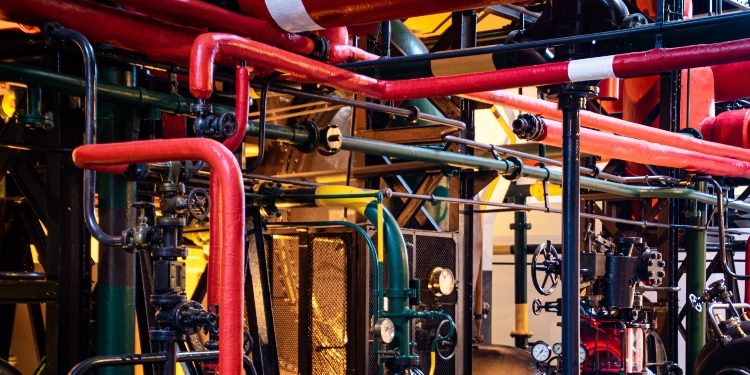Though often underestimated, a small yet mighty component known as the rotary valve plays a pivotal role in streamlining operations and maximizing efficiency. In this blog post, we’ll reveal the hidden potential of this unsung hero and explore how it can significantly boost productivity in various industries. So buckle up, because we’re about to embark on an exciting journey into the heart of industrial optimization!
Understanding the Function of a Rotary Valve in Industrial Processes
A rotary valve is a crucial component in various industrial processes, facilitating material flow control and system efficiency. It acts as an airtight seal, preventing backflow and pressure fluctuations between processing sections or machines by using rotating blades.
Its primary functions include regulating material transfer between different process stages, discharging materials from storage vessels, and safeguarding equipment from abrasive or corrosive substances. Additionally, it maintains a clean environment in sensitive industries like food production and pharmaceuticals. Overall, the rotary valve is integral to maintaining efficiency and product quality in manufacturing operations.
Benefits of Using Rotary Airlock Valves for Productivity
Rotary airlock valve are an essential component in many industrial processes, especially in the manufacturing and processing industries. These valves play a critical role in regulating the flow of materials such as powders, granules and other bulk solids within a production system. One of the primary benefits of using rotary airlock valves is their ability to significantly boost productivity.
- Material Flow Regulation: Rotary airlock valves are essential for controlling material flow in production processes. They create a controlled seal between process segments, ensuring the precise transfer of materials to downstream equipment. This prevents underfeeding or overfeeding, optimizing material usage and preventing production line bottlenecks.
- Downtime Reduction: In industrial settings, downtime is costly. Rotary airlock valves minimize downtime by preventing clogs and damage caused by foreign objects or oversized particles in downstream equipment. They also protect sensitive machinery, reducing maintenance needs.
- Material Loss Prevention: Rotary airlock valves act as a barrier between production processes, ensuring accurate and efficient material transfer. They prevent spillage and leakage, reducing waste and enhancing production efficiency.
- Process Control Enhancement: These valves maintain a consistent and uniform material feed rate, improving process control and minimizing human error in manual feeding processes, ultimately boosting productivity.
- System Capacity Increase: With various sizes and configurations available, rotary airlock valves can be tailored to specific applications. Selecting the right valve enhances system capacity, allowing for more significant material processing, thereby increasing overall productivity.
Common Applications of Rotary Valves in Various Industries
Rotary valves are versatile and essential components in various industrial processes, facilitating smooth material flow, as well as enhancing overall productivity. Their robust design and compatibility with a wide range of materials make them valuable in different industries:
- Food and Beverage: Rotary valves are vital for handling dry goods in processes like pneumatic conveying, mixing and packaging. Their hygienic design is ideal for food processing, ensuring the safe handling of fragile materials.
- Chemical: These valves ensure precise material flow control in the chemical industry, preventing spills and contamination during the transfer of hazardous substances.
- Pharmaceutical: Rotary valves regulate material flow with precision, crucial for processes like tablet pressing, while also maintaining pharmaceutical compliance and preventing cross-contamination.
- Agriculture: They play a critical role in transferring materials in the agriculture industry, ensuring accurate ingredient mixing and effective feed processing.
- Plastics and Rubber: Integral to extrusion processes, rotary valves control material flow and maintain consistent infeed, ensuring product quality. They are also used in plastic pelletizing systems.
- Pulp and Paper: In this industry, rotary valves facilitate the conveying of various materials, preventing clogs or jams in pipeline systems during paper production.
Factors to Consider when Choosing the Right Rotary Valve for Your Process
Choosing the right rotary valve is critical for industrial processes. These devices control material flow by creating an airlock through rotating blades or vanes. Here are key factors to consider when selecting a rotary valve:
- Material Properties: Consider the material’s bulk density, particle size, moisture content and abrasiveness. Select the appropriate valve design and specifications based on these properties (e.g., hardened steel blades for abrasives).
- Process Conditions: Assess temperature, pressure and potential hazards (e.g., flammable materials). Ensure the valve’s construction and safety features match these conditions.
- Required Flow Rate: Determine the necessary flow rate, guiding valve size, speed and horsepower requirements.
- Type of Valve: Different types like drop-through, blow-through and side-entry suit specific applications. Match the valve type to your process needs (e.g., fine powders for drop-through).
- Maintenance and Cleaning: Evaluate the maintenance and cleaning requirements of the valve’s design and construction.
- Budget: Consider the upfront cost, but also assess long-term expenses like maintenance and durability to make a cost-effective choice.
Conclusion
In summary, the significance of investing in high-quality rotary valves cannot be emphasized enough. These valves are pivotal in numerous industrial processes, contributing to optimal performance through their reliability, precision and safety features. Given the array of options tailored to various industries and applications, it’s vital to meticulously assess your particular requirements when selecting a rotary valve for your facility. Opting for a well-established manufacturer with a proven history can guarantee that you receive optimal value for your investment and reap the long-term advantages of a top-tier rotary valve.
David Prior
David Prior is the editor of Today News, responsible for the overall editorial strategy. He is an NCTJ-qualified journalist with over 20 years’ experience, and is also editor of the award-winning hyperlocal news title Altrincham Today. His LinkedIn profile is here.




![7 Best POS Software in the UK [2026 Edition]](https://todaynews.co.uk/wp-content/uploads/2026/02/7-Best-POS-Software-in-the-UK-2026-Edition-360x180.png)








































































